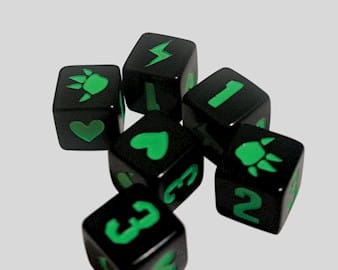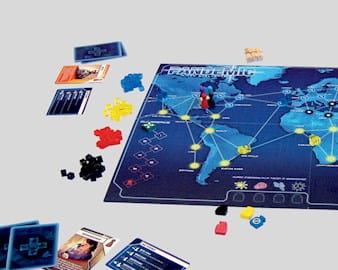
Legions of fans are rolling the dice on the analog pleasures of hobby games.
- By
- May 01, 2016
- Media, Entertainment, and Sports

In an era when a hotly anticipated Xbox One or PS4 release can out-earn a blockbuster film, you might think that sitting around a table, rolling dice, and passing Go is a passé pastime. Buzz! You’d be wrong.
Interest in tabletop games—from epic world-building adventures to clever new card games to crowdfunded indie darlings—is exploding. According to market researcher ICv2, the hobby-games industry is an $880 million market in North America alone. 2015 saw its seventh straight year of gains, with a growth rate approaching 20 percent. Gaming and gamer culture is reaching new heights.

“It’s a rebound from digital,” said Matthew Dabney, ’14, a longtime gamer who presented “Game On: The Role of Games and Play in the Workplace” at the 2016 South by Southwest Interactive Festival.
“When you’re on Facebook, you get a diluted connection with everyone. Board games put you in front of people,” Dabney told CBM during a recent sit-down over coffee. “It is, entertainingly, exactly the opposite of what you have online.”
And if tabletop gaming was once deemed a niche subculture, that era is quickly fading. Last year, the Green Bay Packers’ entire offensive line copped to being “completely obsessed” with The Settlers of Catan, a board game in which players strategically trade goods like wool and lumber.
For Dabney, the allure is simple. “I geek out over other people geeking out, whether it’s for comic books or running or history. I love watching that action ignite. For me, it’s with gaming.”
“It’s a rebound from digital. ... Board games put you in front of people.”
He’s experienced firsthand how the gaming bug can build camaraderie. “My very first job out of undergrad was in the middle of nowhere Michigan, and I was having a little bit of trouble bonding with people,” he said. “An older guy who is very sweet—I did not peg him as a gamer—told me, ‘Oh yeah, we play Settlers every week.’” That friendship, and many to follow, started over a game board.

Currently a digital product manager in the Chicago office of McLean, Virginia-based bank Capital One, Dabney believes the ability of gameplay to build rapport extends beyond the realm of social interaction into the office.
“We’re trained from the time we’re kids on the playground to connect with people through play,” he explained. “If you’re doing any sort of work that involves a team dynamic—especially as you’re pushing more toward colocating services—play is one of the easiest ways to start breaking down barriers.”
Dabney became interested in blending business with aspects of gameplay during an undergraduate internship in experimental economics. In the corporate world, he argued, companies can embrace the concept of play to help employees work at their best. He will soon start consulting with companies on how they can use board games to help build teamwork and creativity.
“We always refer to creativity like it’s a well,” Dabney said. “The problem is we keep drawing from it and we never do anything to replenish it.” Trusting employees to take brief breaks to play a game or take a walk helps them come back to a problem with fresh eyes.
“If you want people to be functioning at their highest state, you have to recognize that that comes with this ability to replenish,” he said. “If you have somebody going 110 percent at one problem over and over again, you’re actually not getting his or her best work.”
Outside of the 9-to-5, Dabney is well versed in conventions, having helped run Chicago Ideas Week, New York Comic Con, and other events. It’s a growing scene—Chicago comic book convention C2E2 draws 70,000 people annually. “There’s a lot of passion in the fandom,” said Dabney, who started his own event technology company 64Hex in 2015.
His next quest is to launch Chicago Game Con, a board game–focused convention designed to bring together the city’s thriving and diverse community of gamers.
“I know a 52-year-old suburban mom who works full-time as a lawyer and loves playing board games. But, she would never think to go to a convention,” Dabney said. “So, how do I get someone like her, and also the 12-year-old whose parents never played and who now wants to learn and get the whole family involved, to come to the same convention? That’s the goal.”
With so many choices, where should a gamer-to-be start? Dabney shares some recommendations:
Spaceteam, a timed co-op app in which players have to fix their malfunctioning spaceship. “I would list it as one of the best icebreakers because it forces you to get into it so quickly.”
Forbidden Island and Forbidden Desert, two co-ops boasting stunning illustrations and a search for legendary treasures, are “good collaborative games that get everyone thinking in the same direction.”
Although planning a successful game night can seem like magic, it doesn’t require sleight of hand. A few simple steps will ensure a fun gathering for beginners and experts alike.
First, simplify your setup. If possible, invite someone who understands how each game works and who can teach others. Online videos that show demo turns, like Wil Wheaton’s TableTop series, can bring the rules to life. “It’s way more fun than reading through the book.”
Next, stage the games like a multicourse meal, Dabney said. Start with a quick and refreshing icebreaker, then move to a game with more meat to it. End on a light game that doesn’t require quite as much thought.
Lastly, consider the size of the party, keeping in mind that simple games that can expand to accommodate many players are ideal for bigger groups.
“This is also something I’m tackling with the idea of Chicago Game Con,” Dabney said. “How do I take that feeling of an intimate game night that you’re used to, and expand the scale where you can sit down with a total stranger and feel comfortable?”
As interest in games continues to increase, so do players’ options.

Go-to authority website BoardGameGeek now lists more than 80 distinct game categories—from quick, crowd-pleasing party games to immersive, civilization-building sagas. Here are some of Dabney’s favorite types:
European Strategy – Also known as German-style strategy, these simple-to-learn games rely more on players’ decisions than luck alone. They often deal with economic themes, such as the smash hit The Settlers of Catan and railroad-builder Ticket to Ride.
Deck-Builders – Players start out with the same 10 or so cards, and “buy” more cards from a community pool as play progresses. “You have this essential process of adapting to what chance is giving you, but still trying to build synergies for what’s happening,” said Dabney, a fan of medieval-themed deck-builder Dominion.
Bluffing – Get ready to make some enemies. These games, such as the classic Diplomacy, encourage players to hoodwink each other and can include hidden information. “You’re trying to ferret that out through interactions. It creates an interestingly tense dynamic.”
Co-ops – If cloak-and-dagger isn’t your idea of fun, try one of these team-based games, such as Pandemic (pictured opposite page, bottom), in which all players are on the same side, working together to win.

G. Scott Uzzell, ’98, has brought authenticity and passion to creating a rich culture inside of Converse—while helping the brand have an influence on culture globally.
When the Shoe Fits
Mo Bhasin, ’15, pushes himself to the limits with the exhilarating sport of kiteboarding.
Booth 101 Kiteboarding
We asked three Booth experts with firsthand perspectives in marketing and consumer products.
How Can Brands Evolve to Meet Consumer Tastes?